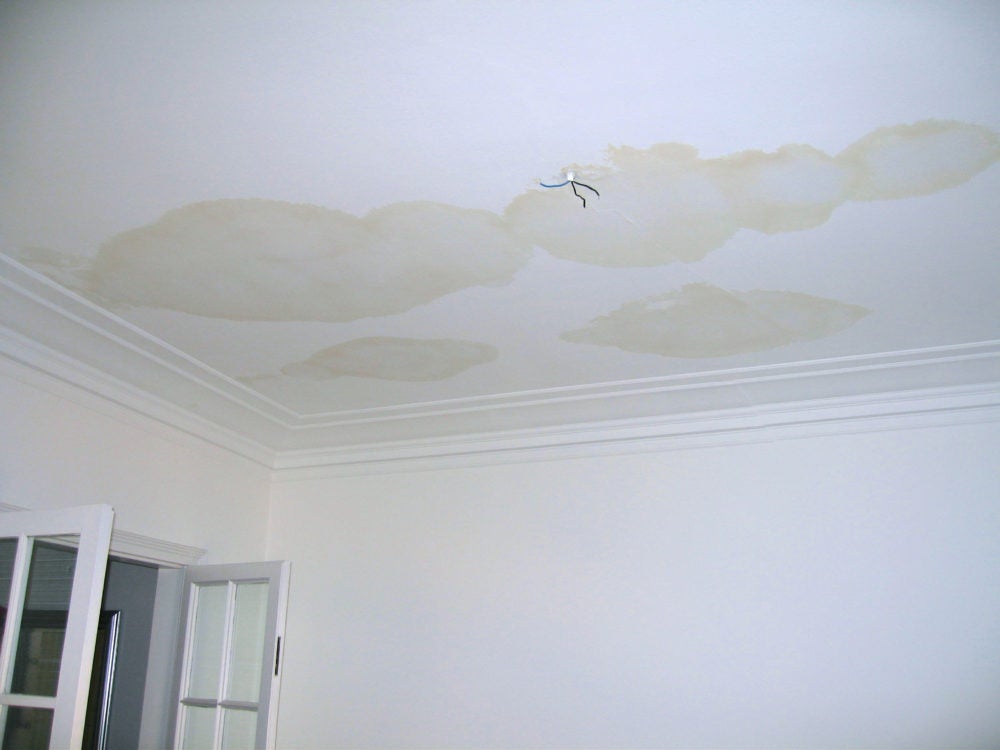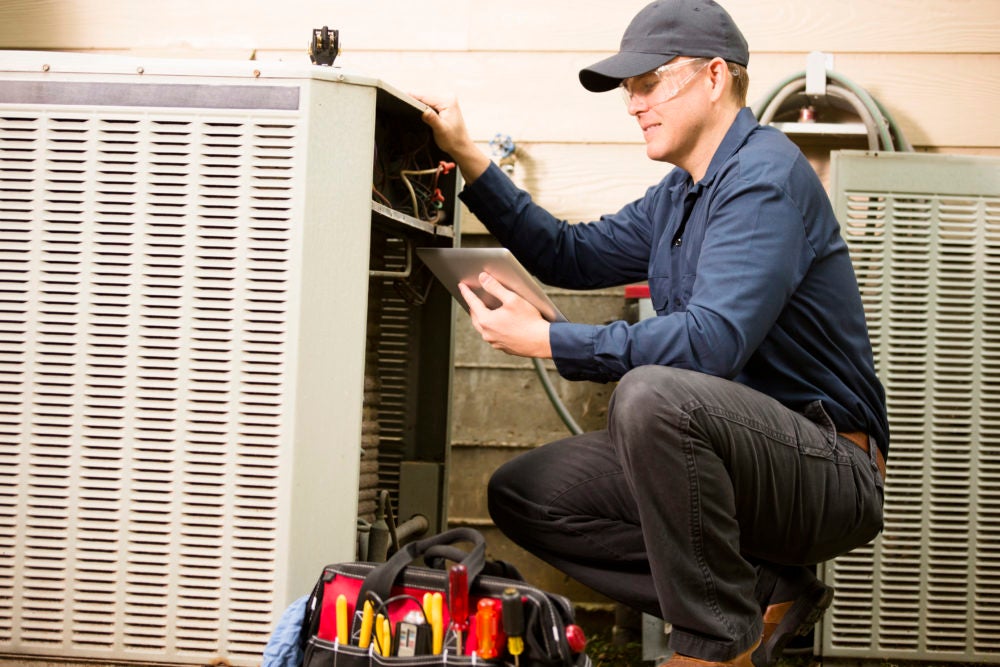Home insurance and home warranties, while similar, are frequently mixed up. Each protection plan serves to alleviate financial hardship and offer peace of mind. However, it’s important to understand the difference between homeowners insurance vs a home warranty to make sure you’re covered for unexpected home repair costs. They’re not the same when it comes to contracts, coverage, and pricing.
In this article, I’ll talk about the difference between a home insurance policy and a home warranty plan, what each policy covers, and why you need them both.
What Is Homeowners Insurance?
Mortgage lenders require homebuyers to purchase home insurance for their homes. A home insurance policy on your real estate protects not only the mortgage lender; it also protects you.
Homeowners insurance protects your home’s structure from various perils outlined in your homeowners insurance policy, such as fire, lightning strikes, tornadoes, and hail.
If your home becomes uninhabitable due to the perils listed above — or similar disasters outside of your control — your homeowners insurance might also cover the cost of short-term housing.
Beyond structural damage, homeowners insurance also includes liability coverage. Liability insurance coverage for homeowners protects against financial loss if someone is injured on your property or if you accidentally damage someone else’s property. It typically helps cover legal expenses and medical bills in such situations.
Homeowners insurance will also replace your personal belongings in the event of disaster, theft, or vandalism.
You will have a deductible along with your policy premium with your homeowners insurance policy. An insurance deductible is the amount you agree to pay out of pocket before your insurance coverage kicks in to cover a claim.

What Is a Home Warranty?
You might be wondering what is a home warranty, and how does it work. A home warranty is a service contract that covers major home systems and home appliances. Items such as HVAC, plumbing, electrical, dishwashers, washers, and dryers in the event they need repair or replacement.
Homebuyers have the option to buy a home warranty when closing on a house, but mortgage lenders do not require a home warranty. In fact, homebuyers can purchase — and cancel — a home warranty plan whenever they want.
A home warranty is an annual plan that protects homeowners from paying exorbitant repair and replacement costs. In the event a major home system or home appliance breaks down due to normal wear and tear, a home warranty will cover it. Instead of covering the entire cost of repairing or replacing an appliance yourself, you call your service provider and pay a modest service fee. This fee is paid to the professional contractor selected, hired, and assigned to the job by your home warranty provider.
I recommend purchasing a home warranty, with a trustworthy home protection company for the service and peace of mind it provides.
Coverage
Homeowners insurance covers structural damage from life-changing events such as natural disasters and burglaries. A home warranty will cover most major systems and appliances inside your home when they fail from normal wear and tear. The coverage provided by a home warranty company is different from that of a homeowners insurance policy.
| Home warranty | Home insurance |
| Major systems, like your HVAC, electrical, and plumbing | Structural damage from severe weather and natural disasters |
| Major appliances, like your refrigerator, stove, and dishwasher | Theft |
| Additional coverage for your swimming pool, septic system or hot tub | Liability if someone gets injured on your property |
Let’s clarify by examining a few scenarios involving systems prone to issues and costly repairs.

Roof Leak Repair or Replacement Scenario #1
During a severe thunderstorm with strong winds, tree limbs fall in your yard, some of which land on your roof, causing a significant roof leak. You have both homeowners insurance and a home warranty plan—which company do you call?
The answer is homeowners insurance. This situation was caused by a hazardous weather condition.

Roof Leak Repair or Replacement Scenario #2
A water ring is forming in the ceiling of the living room. You go outside to see if anything looks amiss and it appears that a few shingles have come loose. A minor leak can escalate into a major issue, so quick attention is needed. You have both homeowners insurance and a home warranty with roof coverage—which customer service line do you call?
The answer is a home warranty provided you have the add-on roof coverage. A home warranty company will repair shake, shingle, and composition roof leaks. Read your service contract for full details on this important add-on coverage.
Air Conditioning Repair or Replacement Scenario #1
You hear a loud thunderclap, and then your air conditioner suddenly stops working — a sign that it may have been struck by lightning. You have homeowners insurance and a home warranty — which customer service line do you call?
The answer is homeowners insurance. You may think a lightning strike sounds far-fetched, but according to the Insurance Information Institute, about one in 385 insured homes has a property damage claim related to fire and lightning. If this happens to you, call your homeowners insurance provider to file a claim.

Air Conditioning Repair or Replacement Scenario #2
It’s 91 degrees outside, and the temperature indoors matches. Despite the AC running, the house isn’t cooling down. You have homeowners insurance and a home warranty — which customer service line do you call?
The answer is a home warranty. If your air conditioning unit is struggling or stopped working, your service request would be to your home warranty company as most plans cover air conditioner repair or replacement.
Clearly from these examples, homeowner’s insurance provides hazard coverage, specifically for items damaged in natural disasters, vandalism, or theft — occurrences I hope you won’t experience.
In contrast, a home warranty plan addresses major appliances and mechanical systems that inevitably fail due to normal wear and tear, providing necessary repairs.
Cost
Home Warranty
A home warranty can save you thousands of dollars in the long run. It protects you from paying for expensive repairs when an item the home warranty covers breaks down.
The age and brand of your covered items or the age or size of your home should not influence your premium. Home warranty premiums are based on your home’s location and the level of coverage you choose. When a claim is approved, you’ll pay a modest service fee to the pre-approved contractor who visits your home to assess the issue.
Exclusions and coverage limits do apply to home warranties. Each home warranty company sets its own cap on coverage. This is a dollar amount that the home warranty company will pay per claim or covered item. This means that the full repair or replacement cost may not be covered, and you will be responsible for paying the remaining balance.
For example, the average cost to replace a refrigerator is $1,925 but the average coverage cap for this appliance is $1,305. In this case, the homeowner will pay $620 out of pocket to replace the refrigerator.
Home Insurance
You might not recall paying for your homeowners insurance since it’s likely bundled with your monthly mortgage payment.
It’s worthwhile to examine your mortgage payment to determine the portion allocated to home insurance. You might be able to get a better deal under the following circumstances:
- You’re able to bundle your home and car insurance policies for a discounted rate
- You’ve made security improvements since buying your real estate
- Your credit score has improved
- You’ve been insured by the same insurance company provider for three years or longer
- Your assets have lost value
In addition to your premium, you’ll need to cover a deductible before homeowners insurance contributes towards damages. Many homeowners opt for a higher deductible to lower their monthly premiums. If this is the case, you could end up paying a significant amount before your homeowners insurance policy steps in.
Many homeowners overlook the limitations of homeowners insurance, similar to home warranties. Shockingly, three out of every five Americans are unaware that they may be underinsured. Understanding the specifics of your homeowners insurance policy is crucial to providing adequate coverage for your property and belongings. Conducting periodic reviews of your policy can help identify any gaps in coverage and prevent surprises in the event of a claim.
Financial advisor Dave Ramsey suggests that you buy enough home insurance to rebuild your home, replace your most valuable personal belongings, cover injuries that occur on your property.
The insurance coverage and premium for your home are influenced by factors such as its size, security, property and belongings value, and location. For example, Florida and Texas homeowners pay 80–90% more than the national average because those states are more susceptible to natural disasters, like tornadoes and tropical storms.
| Home warranty | Home insurance | |
| Premium | $25–$67 per month | $1,000–$4,000 per year |
| Service fee/deductible | $75–$125 per claim | $500–$10,000 per year |
| Pay-out limit | $300–$3,000 payout per covered item | $300,000 on average |
| Cost factors | Location of your home and level of home warranty coverage | Your property’s size, value, security, and location |
Bottom Line
When considering the financial concerns associated with real estate and homeownership, it’s essential to have comprehensive protection in place. By securing both homeowners insurance and a home warranty, homeowners can alleviate anxieties about unexpected repair costs for major home systems and appliances. Both policies safeguard your investment and provide peace of mind.
The bottom line is a home warranty gets used more often than home insurance. Think of it this way: you might never have to use your home insurance, but most homeowners end up making two claims on their home warranty every year. That means a home warranty is like having extra help when things go wrong with your house, like if your heater stops working or your fridge breaks down. It’s there to give you peace of mind and help cover the costs of fixing important stuff around your home.
Along with your homeowners insurance, I recommend purchasing a home warranty. As a real estate agent who has helped hundreds of homebuyers through the years, I’ve found that home warranties provide essential protection.
Summary of Home Warranty vs. Home Insurance
| Home warranty | Home insurance | |
| Requirements | Optional | Required |
| Coverage | Most major appliances and systems | Structural damage, property loss, liability, and short-term housing costs |
| Exclusions | Items must fail due to normal wear and tear, not improper installation, modification, or maintenance | Limited to perils named by the insurance policy |
| Cost | $25–$67 per month | $1,00–$4,000 per year |
| Payment structure | Monthly installments or one-time annual fee | Bundled with monthly mortgage payments |
| Coverage length | 12 months with the option to renew or cancel at anytime | You must let your mortgage lender know before you cancel or change your policy |
Looking for more information on home warranty companies? Check out the expert reviews below o get all the details. Each of these companies gives a free quote.
- Choice Home Warranty review
- American Home Shield review
- Select Home Warranty review
- Amazon Home Warranty review
- First American Home Warranty review
- Liberty Home Guard review
Frequently Asked Questions
What does a home warranty cover?
A home warranty is a residential service contract that covers major home systems and home appliances within your home, such as HVAC, plumbing, electrical, dishwashers, ovens, clothes washers, and dryers.
What does homeowners insurance cover?
Homeowners insurance covers damage to your home’s structure in cases of peril deemed in your homeowners insurance policy. “Perils” include fire, lightning strikes, tornadoes, and hail.
Is a home warranty the same as homeowners Insurance?
A home warranty is different from homeowners insurance.
A home warranty plan handles the service, repair, and replacement of major home systems like HVAC, electrical, and plumbing, as well as major appliances. Type of coverage is outlined in the service contract.
What are the cons of a home warranty?
Home warranties are not the best option for every homeowner. Even though the cost of a home warranty is generally low, each plan requires a monthly or annual premium plus a fee when a service technician is sent to your home.
What Are the Pros of a Home Warranty?
A home warranty has many advantages. For example, if you don’t have a home emergency fund, a broken system or appliance can drain your bank account. When you have home warranty coverage, you don’t have to worry about spending all your money to get your systems back up and running.













